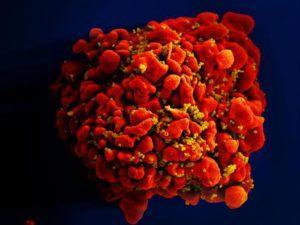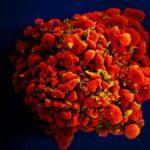
H9-T cell (red) infected by HIV particles (yellow) (Public Health Image Library, NIAID, Image ID:18143)
Neutralising antibodies that target the HIV Envelope have been studied extensively to develop both therapeutic and preventative vaccines against the virus. Therapeutic vaccines are different from preventative vaccines as their purpose is to suppress viral replication in individuals who are already infected with HIV as opposed to preventing infection. One way this could be achieved would be through passive immunization with broad and potent anti-HIV antibodies.
One of the antibodies of interest for HIV therapy is 3BNC117, a neutralising antibody which targets the CD4-binding site on the HIV Envelope. Previous studies have found this antibody to be extremely potent as well as broad. Breadth is important as it is desirable for an antibody to be able to neutralise a wide range of viruses across the different HIV subtypes.
Researchers at The Rockefeller University conducted a Phase IIa clinical trial to see whether 3BNC117 could suppress viral rebound on cessation of antiretroviral therapy in 13 HIV infected participants. They selected participants who were known to have virus populations sensitive to the antibody, high CD4 counts and low viral load.
Infusing participants with 3BNC117 led to a delay in viral rebound for an average of 6.7 weeks after two infusions and an average of 9.9 weeks after four infusions. The antibody infusions were well taken with minimal side effects. In most cases, the viral rebound was from one viral variant and these viruses had increased resistance to 3BNC117. Despite this, 30% individuals who were virally suppressed generally did not have 3BNC117-resistant viruses when new virus eventually emerged.
These data suggest that 3BNC117 may be able to prevent the replication of HIV coming from latent reservoirs to such a great extent that the virus remains suppressed. This antibody may be a desirable candidate for a new treatment of HIV. Due to the fact that some viruses were able to escape from 3BNC117-neutralisation, a combination of broadly neutralising antibodies may need to be administered.
Journal article: Scheid et al., 2016. HIV-1 antibody 3BNC117 suppresses viral rebound in humans during treatment interruption. Nature
Article by Thandeka Moyo
